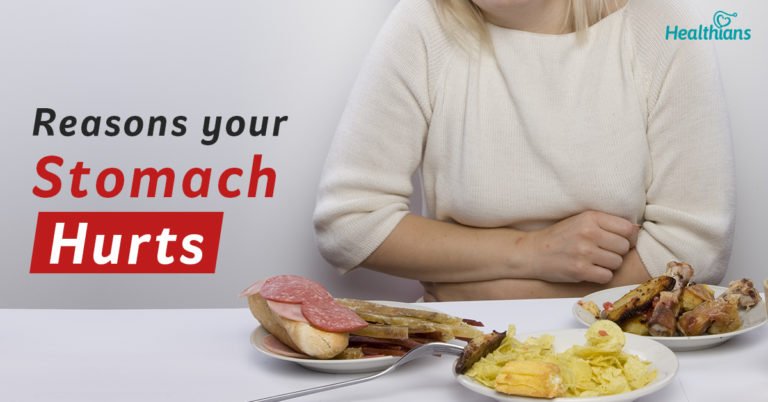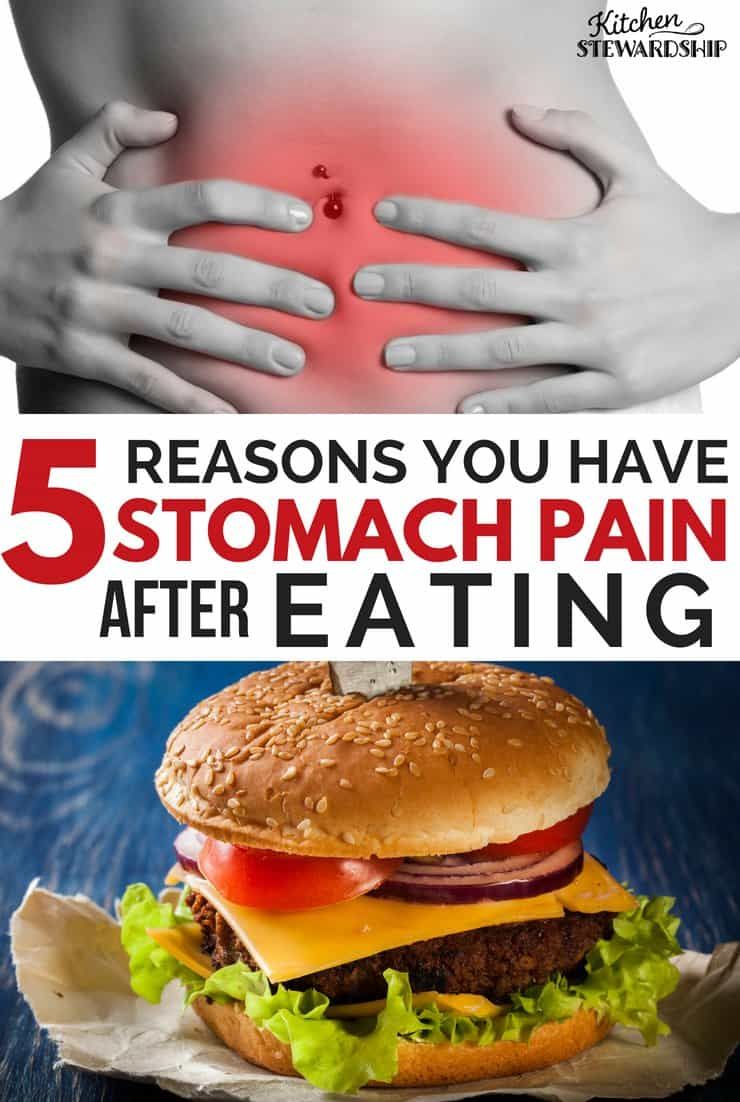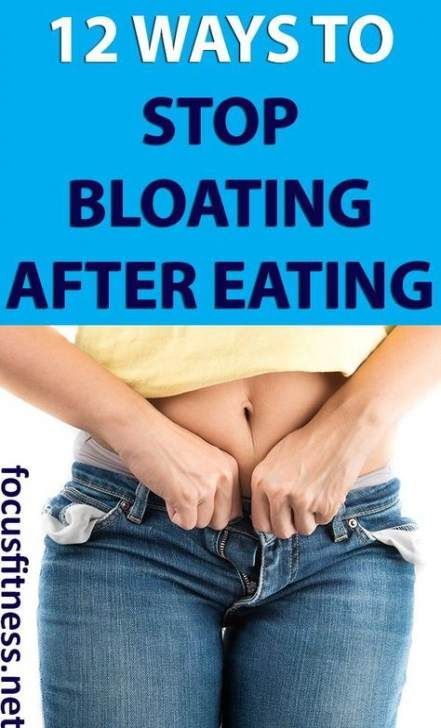Right Or Left Lower Abdominal Pain In Women
Sudden onset of right lower abdominal pain or left lower abdominal pain can indicate a ruptured ovarian cyst in a woman who is mid-cycle. This kind of pain could also be a sign of ovarian torsion, which is the rotation of the ovary and part of the fallopian tube, or possibly a twisting of the ovary due to compromised blood supply. Seek treatment immediately at the nearest emergency department. Surgery to remove the ovary may be required.
Find The Cause Of Your Stomach Pain After Eating
Its important to remember that stomach pain after eating is a common problem that may stem from an underlying health condition such as pancreatitis or diverticulitis, or food sensitivity. Your pain can range from mild to severe, and depending on the cause, it may indicate damage to the lining of your gut.
The pain may occur within a few minutes to hours after eating, and the timing of the painful discomfort may help you to narrow down what food or disorder caused the agony. The location of the pain may also determine if the pain is caused by a serious event such as appendicitis.
Stomach pain after eating may be the result of an intolerance to foods like bananas, eggs, or peanuts and may be prevented by avoiding the culprits.
Pain may also be prevented by changing your overall eating habits. You can start by maintaining a regular eating routine of healthy foods and avoiding triggers that may be causing the pain.
Also Read:
What Causes Abdominal Pain
There are many underlying causes of abdominal pain. Some of these are short-term causes that arent serious the symptoms may last only hours or days, and may clear up by themselves. Others are longer lasting and may be more serious.
There are also causes of abdominal pain that require urgent medical attention and may be life-threatening.
Some causes of abdominal pain are more common or less likely in certain age groups or genders.
Children often get stomach or abdominal pain. Some of the most common causes are gastroenteritis, wind or indigestion. Some causes of abdominal pain apply mainly to children, such as colic, intussusception, and testicular torsion. For more information on these, see abdominal pain in children.
Women may experience abdominal pain associated with their periods, pregnancy or problems with their urinary or reproductive system.
Older people are more likely than younger people to have abdominal pain due to heart or lung problems, bowel obstruction, or conditions such as diverticulitis or gallstones.
Recommended Reading: How To Relieve Stomach Pain When Pregnant
Belly Pain In The Lower Left Side That’s Worse When You Move
Abdominal pain in the left lower area of the abdomen may signify diverticulitis, small pockets in the colon that can become obstructed and tear. Traditional treatment includes antibiotics and stool softeners to reduce the risk of abscess formation. Physicians say according to recent research, antibiotics may no longer be needed in this scenario, recommending acetaminophen instead.
When To See A Doctor

If your digestive distress has lasted for more than one week, you are experiencing long term loss of appetite or vaginal bleeding, unexplained weight loss, long-term diarrhea, long-term bloating, a burning sensation when you urinate or pain that is extreme. It is important to seek medical attention. This is especially important if you have recently experienced an abdominal injury, the pain is incredibly sharp or your abdomen has become rigid or you are vomiting blood. Contact your doctor to determine whether emergency medical care is necessary.
Read Also: Why Would Your Stomach Hurt
Vague Upper Abdominal Pain Associated With Nausea And Belching
Sometimes stomach pain is hard to identify or comes with multiple symptoms. Vague pain in the upper and mid-abdominal area that is linked to nausea, burping, or belching could be signs of a heart attack, particularly in older patients. Physicians say tests like an ECG or cardiac markers can be lifesaving. They also warn that vomiting with back or jaw pain and shortness of breath can also be a sign of a life-threatening emergency.
Other Causes May Include
- Stomach ulcers these are sores which can develop on the stomach lining, which are made worse by eating certain foods. Abdominal pain is usually the main symptom. See your GP as stomach ulcers require treatment.
- Irritable bowel syndrome a common condition which affects digestion. Adjusting your diet can help.
- Food intolerance whether its lactose, gluten, fructose or sulphites, an undiagnosed food intolerance could cause stomach cramps after meals. Try keeping a food diary to monitor your symptoms and identify a pattern.
You May Like: How Do You Burn Stomach Fat Fast
How Is Abdominal Pain Treated
Treating abdominal pain depends on its cause. Options include:
- Medications for inflammation, gastroesophageal reflux disease or ulcers.
- Antibiotics for infection.
- Changes in personal behavior for abdominal pain caused by certain foods or beverages.
- Local or spinal injections of numbing agents or corticosteroids by pain management physicians.
In more severe cases like appendicitis and hernia, surgery is necessary.
What Is Stomach Pain
The stomach is the organ responsible for most of your foods digestion. Breaking down food swallowed through your esophagus and sending the resulting mixture onto the small intestine is the stomachs primary function.
Most everyone has had a stomach ache after eating at some time or another. The causes are usually quite benign, ranging from overindulging to simply eating something that didnt agree with you. However, frequent stomach pain after eating is a sign of a deeper problem and shouldnt be ignored.
Stomach aches and pains can happen at almost any point during this process. While some of this is usually normal, see a doctor right away if youre experiencing:
- Unintentional weight loss
Also Check: How Do You Know If You Have Ulcers In Stomach
When Should You See A Doctor
Is stomach pain after eating a regular occurrence for you?
It may be time to visit a medical professional, naturopathic doctor, or holistic nutritionist. A stomachache after eating should go away after a few hours, but if your pain has lasted for more than a week or if a stomachache occurs after every meal, speak with your doctor.
Yes Cancer Can Cause Your Stomach To Ache After Eating But There Are A Few Things You Need To Know About This Variables To Consider And When To Be Alarmed
A stomach ache after eating is usually not caused by cancer. Usually is the key word here, because it means that there are cases in which this symptom IS being caused by a malignancy.
It is possible, but not very probable, especially early in the course of the cancer, says Mark Levandovsky, MD, Founder and Medical Director of Preventive Medicine and Cancer Care. Dr. Levandovsky is a board certified internist and oncologist/hematologist in practice for 20 years.
The lack of high probability means that if youre experiencing this symptom, there is no need to panic.
But there IS a need to see a doctor.
Dr. Levandovsky explains, Pressure, compression or impingement of nerves/organs would typically be responsible for pain, which happens in more advanced stages.
However, irritation of the mucus lining by abnormal/cancerous cells can cause pain shortly after eating due to acid buildup in the stomach, esophagus or small bowel.
Also Check: When You Have Cramps In Your Stomach
Home Care For Stomach Pain After Eating
If you are experiencing mild stomach pain after eating, you can take some helpful steps that are listed below:
- When you have overeaten or are dealing with digestive discomfort it is important to drink water and clear fluids to stay hydrated.
- Avoid solid foods for a few hours, especially if you have been vomiting. When you begin to eat solid foods again, start with foods that are easy to digest such as applesauce, plain crackers or rice.
- Avoid any foods that may have caused your initial distress. If you are feeling heartburn or indigestion, cut out greasy foods, alcohol or carbonated beverages and take an antacid to help cut the pain.
- Do not take aspirin, narcotics or anti-inflammatories until you have determined the cause of your digestive distress.
Heres How The Digestive System Works

Or how digestion should work when everything goes according to plan.
Your body employs multiple organs to turn the food you eat into energy. When everything is going well, you should barely notice this process, which is good because it can actually take a pretty long time. The Mayo Clinic estimates that it takes two to five days for a mouthful of food to go through all the various digestive processes and come out the other end looking unrecognizable.
First, though, this all starts with one bite. Between the chewing action of your mouth and the enzymes and lubrication from your saliva, you start to break down what youre eating, the National Institute of Diabetes and Digestive and Kidney Diseases explains. Once the bite is small enough to swallow, your tongue pushes it to the back of your throat into your esophagus, which begins to contract automatically in a motion called peristalsis.
The first organ the newly chewed food encounters after this is the stomach. Muscles in your stomach walls churn the food and release acid and enzymes, slowly mixing the food into a paste called chyme. Your stomach gradually releases the chyme into the small intestine, which reduces it further by mixing it with enzymes from the pancreas and from bacteria, along with bile from the liver, all while pushing the chyme further through the digestive tract. The walls of the small intestine absorb the extracted nutrients and water, which move into your bloodstream.
Also Check: How To Get Rid Of Stomach And Thigh Fat
Stomach Pain As An Allergic Reaction
The U.S. National Library of Medicine reports that tree nuts such as almonds are one of the “problem foods” that most commonly trigger allergic reactions. Even a mild allergy to almonds can cause gastrointestinal symptoms such as abdominal cramps and pain, nausea, diarrhea and vomiting. If you consistently have stomach pain after eating almonds, it might be a good idea to consult your doctor to rule out the possibility of an almond allergy.
There is no cure for an almond allergy, so you will need to create an elimination diet with your doctor to prevent symptoms from recurring. No matter how much you like almonds, you may have to stop eating these nuts if you develop stomach ache or abdominal cramping every time you eat them.
If you experience serious symptoms after eating almonds such as severe dizziness or difficulty breathing contact a doctor right away, because these are symptoms of a life-threatening allergic reaction called anaphylaxis, according to the Centers for Disease Control and Prevention . This condition can lead to death if not treated.
Causes Of Recurrent Stomach Pains
- Stress or Worries. The most common cause of frequent stomach pains is stress. Over 10% of children have a “worried stomach.” These children tend to be sensitive and too serious. They often are model children. This can make them more at risk to the normal stresses of life. Examples of these events are changing schools, moving or family fights. The pain is in the pit of the stomach or near the belly button. The pain is real.
- Abdominal Migraine. Attacks of stomach pain and vomiting with sudden onset and offset. Often occur in children who later develop migraine headaches. Strongly genetic.
- Functional Abdominal Pains. Functional means the stomach pains are due to a sensitive GI tract. The GI tract is free of any disease.
- School Avoidance. Stomach pains that mainly occur in the morning on school days. They keep the child from going to school.
Recommended Reading: What Is The Home Remedy For Gas In Stomach
Stomach Cramps Due To Fiber Intake
The average American only eats about 16 grams of the recommended 20 to 35 grams of fiber daily, according to the NLM. One ounce of almonds contains 3.6 grams of dietary fiber, according to the USDA. If you eat a lot of almonds and your system isn’t accustomed to processing that much fiber, you might develop cramping, bloating and gas for a few days.
Eating over 70 grams of fiber in a day, regardless of the source, can result in cramping, diarrhea and other symptoms of gastrointestinal distress, according to Duke University. If you eat a lot of almonds in one sitting, their high fiber content might put you over your daily limit and cause temporary cramping. In most cases, this fiber-induced pain will subside within a few hours. Contact your doctor if the discomfort persists.
You Might Have Eaten More Than Your Stomach Could Handle
Experts say this tends to be the most common cause for this specific type of discomfort. Im sure all of us have had that situation where weve eaten too much and we get stomach cramps, Suneeta Krishnareddy, M.D., M.S., assistant professor of medicine in the faculty of digestive and liver diseases at Columbia University Medical Center, tells SELF. Its usually just caused by the stomach stretchingbecause it is a very stretchy organbecause theres too much food in there. This stomach stretching can also happen because of the bacteria in your G.I. tract trying to help you break down the food, which can cause gas and distension, Dr. Krishnareddy says. That stretch in some people causes pain or cramping, she explains.
To be super clear, were not saying theres anything inherently wrong with sometimes eating a lot . Eating past the point of fullness on some occasions can actually be part of having a normal relationship with food. And, of course, if you deal with a disordered eating issue like binge eating disorder, navigating how much you eat can be really complex and not feel entirely under your control right now. So, seriously, no judgment here. But if youre dealing with stomach cramps after eating often and think its because you have a hard time not eating past the point of fullness, talking to a doctor, therapist, or registered dietitian may help.
Also Check: What Exercises To Do To Lose Stomach Fat
You May Be Sensitive To Avocado Chemicals
The other possible reason could be certain natural chemicals present in the fruit. Many people can be sensitive to certain chemicals that occur naturally in food items.
Salicylates, glutamates, tyramine, and histamine in avocado are potential culprits. Salicylates are what make you sensitive to aspirin, and tyramines in aged cheese or other fermented food can give you a migraine attack.
Avocado is rich in glutamates and amines like tyramine and histamine whose levels increase with the ripening and softening of the fruit. While some people tolerate these compounds easily, some are sensitive to them. They could experience abdominal pain accompanied by other gastrointestinal symptoms like stomach upset, gassiness, or flatulence.3 Avocados also contain salicylates, which cause gas, bloating, stomach pain, and even diarrhea.4
Possible Causes Of Stomach Cramps After Eating
Pinpointing the cause of an upset stomach after eating isnt always easy. Stomach pain often presents in different ways and in different locations. The abdominal cavity is home to a large number of organs and a variety of different processes. Because there is so much going on, it can be hard to determine whats actually happening.
Recommended Reading: What Can Cause My Stomach To Hurt
Severe Stomach Pain After Eating A Fatty Meal
If you find yourself doubled over after eating a high-fat meal, you may be experiencing a gallbladder attack. “Women are especially prone to gallbladder disease,” says Hardeep Singh, MD, gastroenterologist from St. Joseph Hospital, Orange, CA. “Overweight women in their 40s are at highest risk.” The pain becomes worse after eating, lasts 30 to 60 minutes, and may come and go, becoming more constant and severe over time, says Singh.
Why Does My Stomach Hurt

Tummy troubles are a common cause for a visit to the doctors office. When patients complain of stomach pain, they are sometimes describing pain that is throughout the abdomen area and may not actually be directly related to the organ known as the stomach.
Doctors first try to determine if a patients abdominal pain is caused by a structural or functional problem.
Sometimes the digestive tract does not function properly due to an abnormality with the structure of an organ. Medical imaging will show that the organ does not look normal and is not working properly.
The gastrointestinal system has its own nervous system to control the muscle contractions that digest the food you eat. Functional problems, also called motility disorders, result from poor nerve and muscle function in the digestive tract. Gastrointestinal organs with motility problems will usually look normal on medical imaging tests, such as CT scans or MRI scans, but the organs do not work like they should. Because functional disorders are hard to see in imaging, they can be challenging to diagnose.
Also Check: How To Reduce The Size Of Your Stomach Without Surgery
Sugar Intolerance May Result In Stomach Ache
The sweet taste of sugar may cause severe pain in stomach after eating too much of it. This may be caused by poor digestion of the sugar, and it eventually breaks down in the lower intestine, producing gas. In carbohydrate form, the sugar may stimulate pain if not expelled. A sugar intolerance may also be seen with the use of milk products, as milk contains sugar in the form of lactose.
Weather also may initiate sugar-induced stomach pain as extremely high temperatures may cause you to reach for cold, sweet drinks such as soda, iced tea, lemonade, and alcohol. The high content of sugar may cause pain and bloating from gas formation.